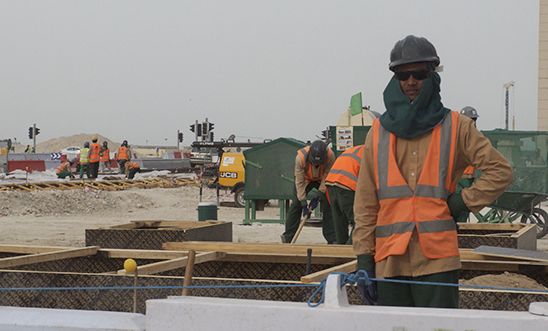
Qatar: World Cup migrant workers unpaid for months

An engineering company involved in building infrastructure linked to the 2022 FIFA World Cup took advantage of Qatar’s notorious sponsorship system to exploit scores of migrant workers.
Mercury MENA failed to pay its workers thousands of dollars in wages and work benefits, leaving them stranded and penniless in Qatar.
Many employees had made huge sacrifices and taken out ruinous loans to take jobs in Qatar. They ended up working unpaid for months on end and in at least one case the company refused a workers’ request to return home by denying him an ‘exit permit'.
Exploitation exposed
We interviewed 78 former Mercury MENA employees from India, Nepal and the Philippines, all of whom are owed substantial sums by the company.
In Nepal, where more than a third of the population lives on less than £1.50 a day, we spoke to 34 people who are owed an average of £1,500 each.
The company also failed to provide residence permits to workers, which led to additional restrictions on their ability to move jobs or leave the country.
'I’m imagining things during [the World Cup]…People from all over the world cheering, laughing, touring some of the beautiful stadiums, recreational sites and hotels here… Will they ever think ‘what are the stories behind those structures?’
Ernesto, from the Philippines, worked as a piping foreman in Lusail City, Qatar. When he left after two years, he was owed four months of wages and in greater debt than when he arrived.
Nepali workers caught in debt trap
Some Nepali workers we spoke to had been forced to sell land or take their children out of school in order to pay the debts they incurred to pay for their migration to Qatar.
Recruitment agencies hired by Mercury MENA illegally charged workers high fees for their jobs, compelling them to take out high-interest loans. This pushed them into severe debt that made it difficult for workers to escape or challenge exploitative conditions.
One agency admitted to Amnesty that it knew of incidents of labour rights abuse at Mercury MENA but did not follow up with the workers to ensure their labour rights were being respected.
No measures have been taken against this agency by the Nepali government.
What Mercury MENA say...
Mercury MENA, formerly known as Mercury Middle East, played an important part in constructing a showcase stadium central to Qatar’s winning presentation to FIFA in December 2010.
Since then, migrant workers employed by the company have worked on some of the country’s most prestigious projects.
In November 2017, we spoke to the CEO who acknowledged long-standing pay delays but denied exploiting workers.
He said that Mercury MENA had been the victim of unscrupulous business partners resulting in 'cashflow problems' and a number of disputes over payments with contractors and clients.
Communications between Mercury MENA and its workers show that the company’s management were fully aware of the problems with salary payments, and continued to make promises to pay wages that were ultimately not kept.
The company has failed to respond to further correspondence with us.
Urgent reform needed in Qatar
Despite the promise of major reforms, Qatar’s labour laws still fail to comply with international standards.
Employers can still prevent workers from changing jobs in Qatar, sometimes for up to five years. Workers who change jobs without the permission of their employers are accused of “absconding”, a criminal charge leading to possible detention and deportation.
We're calling on the Nepal and Qatar governments to support the former Mercury MENA workers to get justice and receive the money they’re owed and to stop this happening again in the future.